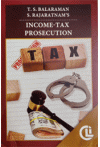- Author(s): T.S.Balaraman, S. Rajaratnam
- Publisher: Company Law Institute of Indian Pvt Ltd
- Edition: 3 Ed June 2016
- Approx. Pages 468 + Contents
- Format Paperback
- Approx. Product Size 24 x 16 cms
- Delivery Time 3-5 working days (within Kerala & South India) (Others 7-9 days)
- Shipping Charge Extra (see Shopping Cart)
......................................................................................................................................
Description
There are a number of well written and standard books on Income-tax law and on criminal law, particularly the Code of Criminal Procedure and the Indian Evidence Act. The object of this book is to present the salient aspects of the three statutes in the context of Chapter XXII of the Income-tax law at one place. The approach is to deal with the offences under the Act, and the other statutes on criminal law and law of Evidence, incorporating the case law that has developed on prosecution in criminal cases having relevance to income tax offences over the years. Practitioners of law generally refer to law journals reporting cases in their specialised field of interest using primarily the back volumes of the Law Reports. The book seeks to provide a reference to cases under tax as well as criminal law at one place for the convenience of both tax professionals and lawyers on the basis of the felt needs realised by the authors placing their experience in the field during their career while in service and after. The book can be referred separately by chapters without the need to read the same chronologically. For this purpose, case law on topics have, income places, been repeated at relevant parts to save time for easy access to the references for busy Accountants, Advocates and any one having anything to do with prosecution of income tax offences during tax representation, prosecution, trial and appeals in the Courts. A balance and neutrality has been maintained in discussing all the aspects of the prosecution and defence touching upon the possible lacunae in the Act in view of the urgent need for the Finance and Tax mandarins to examine critically some provisions of the tax law, in the light of judicial pronouncements adversely affecting successful prosecution of offences. Specifically, the provisions of sub-section (5) of section 139, sub-section (4A) of section 132, clause (c) of sub-section (1) of section 271 and sections 276C and 292C should be reviewed in the context of judicial interpretation, which are in favour of the errant taxpayer. Besides, a pronouncement of the Supreme Court needs to be examined in its application to section 273A and sub-section (1A) of section 279 of the Act. Since only about one per cent of returns are taken up for scrutiny and the odds of being hauled up for tax evasion being very low, there is an urgent need to ensure that law serve its purpose.
......................................................................................................................................
Contents
Chapter 1 : Introduction : Tax Crimes Prosecution and Defense
Chapter 2 : Income Tax Prosecution Policy and Practice
Chapter 3 : Tax Offences Constituting Crime
Chapter 4 : Corporate Tax Offences a Perspective
Chapter 5 : Civil and Criminal Proceedings Assessment and Prosecution
Chapter 6 : Tax Offences - I
Chapter 7 : Tax Offences - II
Chapter 8 : Tax Offences - III
Chapter 9 : Tax Offences - Iv
Chapter 10 : Tax Offences - V Company Directors
Chapter 11 : Tax Offences - VI Partner of Firm
Chapter 12 : Tax Offences - Presumption Section 278 C, 278 D, 278 E
Chapter 13 : Penalty and prosecution revised return and appeal
Chapter 14 : Sanction and complaint
Chapter 15 : Court procedure and pre-trial
Chapter 16 : Avoiding trail Quashing [section 482], Discharge [section 245]
Chapter 17 : Evidence and criminal proceedings
Chapter 18 : Accounts books, delays and other matters
Chapter 19 : Trail preparation prosecution
Chapter 20 : Trail preparation Defence
Chapter 21 : Trail Preparation search and seizure cases
Chapter 22 : The Trail
Chapter 23 : Criminal appeal, revision and writ
Chapter 24 : Compounding the offence
Annexure 1
Annexure 2
Annexure 3
Annexure 4
Annexure 5
Index
......................................................................................................................................
Author Details
Shri. S.Rajaratnam, M.A., LL.M., F.C.M.A., joined Indian Revenue Service in 1951 and retired as Accountant Member of Income-tax Appellate Tribunal in 1985. During his service, he was deputed to Sri Lanka as Tax Expert in 1960-62 and to Government of Tamilnadu as Member of Sales Tax and Agricultural Income-tax Appellate Tribunals in 1971-75. He is currently Director (Education & Research), Society of Auditors, Chennai with chamber practice as consultant. He has authored several books and writes for various tax journals. He has co-authored “Treatise on Double Taxation Avoidance Agreement” and “Law and Procedure on Charitable Trusts and Religious Institutions" (Published by Snow White, Mumbai) and “Tax Planning” (published by jointly Bharat Law Publications, Jaipur and LexisNexis, Gurgaon, Haryana), besides various other titles authored by him and published by Company Law Institute of India Pvt. Ltd. viz. Tax Audit Report, Tax Management, Tax Valuation and “Landmark Cases in Direct Tax Laws - 2014” (Fifth Edition). He has also [3:55 pm, 01/11/2021] Law Book Store: updated Eleventh Edition of Sampath Iyengar's “Law of Income-Tax” in eight volumes with Twelfth Edition is an on-going one (published by Bharat Law House, Delhi). He is associated in the management of a number of professional and public institutions. His autobiography under the title "In and around Tax Track” published by LexisNexis, New Delhi is in the press.
T.S. Balaraman, B.Sc. (Hons), LL.B., is one of the first batch of Indian Revenue Service Officers trained in Investigation and conduct of search and seizure. Later, he resigned from the IRS and worked as Corporate Tax Advisor for over 25 years. He ha considerable experience in briefing counsel and assisting trial lawyers in court for cross examination of witnesses in prosecution for tax offences as also for offences tried in CBI courts, for successful defence of the accused ending in acquittal, all the way through criminal appeals against the acquittals.

